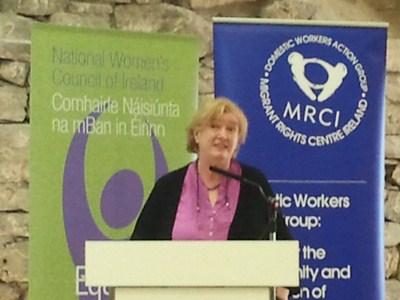Domestic workers still making dots behind closed doors

Yesterday marked not only the 100th anniversary of International Women's Day but the launch of a global campaign to mobilise support for an International Labour Organisation (ILO) Convention for decent work and rights for domestic workers. By Alison Spillane
Launching the campaign, Siobhán O'Donoghue, director of the Migrant Rights Centre Ireland (MRCI), said the new government should lead the international campaign and establish best-practice instead of waiting for other countries to make the first move.
The campaign launch was a joint venture between MRCI's Domestic Workers Action Group (DWAG) and the National Women's Council of Ireland (NWCI).
NWCI CEO Susan McKay told attendees Irish women had a shared history with migrant women in Ireland in terms of domestic work, she said an ILO Convention was crucial for recognising work that hasn't been recognised as work for centuries.
An ILO Convention creates international law setting forth standards that guarantee labour rights. Should a Convention on decent work and rights for domestic workers go ahead, it would recognise domestic workers as workers with the same rights as other workers.
DWAG says this Convention will "pave the way for the reduction of slavery-like conditions, abuse, violation, inequality, and discrimination that domestic workers face. It will help reduce the worst forms of child labour, the stigmatisation and criminalisation, and violation of rights of migrant domestic workers, and racial and ethnic discrimination".
Workers' rights activist Inez McCormack (pictured) spoke about Irish women and girls working in the early twentieth century who were paid 1p for every 384 dots handsewn onto a handkerchief. She said domestic workers today "are still making dots behind closed doors".
Ms McCormack said the price of globalisation without humanity was shown in the documentaries screened at the campaign launch. "The absence of right is the practice of humiliation", she said.
Speaking about the prospect of an ILO Convention Ms McCormack said it was vital that those directly affected by the issue had a voice at the negotiating table.
Ictu's workers representative to the ILO, Esther Lynch, also spoke at the event. She invited members of the DWAG to be part of the Ictu delegation to the ILO, although they would not be able to vote. Ms Lynch said a Convention on Decent Work and Rights for Domestic Workers would ensure proper sanctions for employers. She said it would also need to state clearly how the law will apply to domestic workers employed by diplomats.
Under the current system, diplomats can avail of diplomatic immunity as the South African Ambassodor did in 2009 in an employment case taken by Ukrainian domestic worker, Valentyna Khristonsen.
DWAG's Hilda Regaspi highlighted some of statistics from a 2010 DWAG survey which found that 40% of domestic workers surveyed did not have an employment contract, 38% were paid below the minimum wage and 44% had raised a complaint with their employer about their unfair treatment and long working hours but their concern was ignored and nothing changed.
Ms Regaspi also spoke about some of the obstacles facing exploited domestic workers in seeking help such as isolation, a lack of knowledge about their rights, and the fact that their immigration status and work permit are tied to their employer. MRCI has campaigned extensively for the right of migrant workers to change employer.
Speaking from the audience, Siptu's Rhonda Donaghy said the current economic climate could not be used as an excuse to deny workers dignity and rights.
To support the campaign you can sign the petition calling on the government to vote in favour of a Convention on Decent Work and Rights for Domestic Workers at the ILO Convention in Geneva in June. You can also write a letter to the Minister for Labour Affairs asking them to support the Convention.
On Friday (11 March) CrisisJam will publish a special issue for International Women's Day which will feature an article on domestic workers' rights by Aoife Smith of DWAG.
As part of the campaign launch, a series of short films, Hidden Voices: Stories from behind Closed Doors were screened to highlight the experiences of domestic workers in Ireland. Below is one short, to see more visit MRCI's youtube channel.
